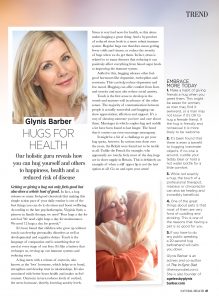Getting or giving a hug not only feels good but also does a whole host of good. In fact, a hug releases so many feel-good chemicals that making this simple action part of your daily routine is one of the best things you can do to de-stress and boost wellbeing. According to the late psychotherapist, Virginia Satir, a pioneer in family therapy:
We need 4 hugs a day for survival, 8 for maintenance and 12 for growth
It’s been found that children who grow up without touch can develop personality disorders as well as developmental and cognitive delays. Touch is the language of compassion and is something that we need at every stage of our lives. It’s like a battery that recharges us, revving up our immune systems and reducing stress.
A hug starts with a release of oxytocin
Also known as the ‘love’ hormone, it helps us to bond, strengthen and develop trust in relationships. It’s also associated with better heart health and makes us feel content. Oxytocin in turn reduces levels of cortisol, the stress hormone, thereby lowering anxiety levels.
Stress is very bad news for health
This alone makes hugging a great thing.
And a by-product of reduced stress levels is a more robust immune system. Regular hugs can therefore mean getting fewer colds and viruses, or reduce the severity of bugs when we do get them. In fact, stress is related to so many diseases that reducing it can positively affect everything from blood sugar levels to improving the immune system.
Added to this, hugging releases other feel- good hormones like dopamine, endorphins and serotonin.
Hugging can help reduce depression and low mood
It can also offer comfort from fears and worries and may also reduce social anxiety.
Touch is the first sense to develop in the womb and matures well in advance of the other senses. The majority of communication between people is actually nonverbal and hugging can show appreciation, affection and support. It’s a way of showing someone you love and care about them. Marriages in which couples hug and cuddle a lot have been found to last longer. The bond that it creates can even encourage monogamy.
It might be a bit of a challenge to get your hug quota, however. In various tests done over the years, the British were found not to be tactile at all. Unlike the French for example, who apparently are touchy feely most of the day, hugs are in short supply in Britain. This is definitely an example of when a stiff upper lip is not the best option at all. Go on and open your arms!
Embrace more today
- Make a habit of giving friends a hug when you greet them. This might be easier for women, as men may find it awkward, or a man may not know if it’s OK to hug a female friend. If the hug is friendly and nonsexual it is more likely to be welcome.
- It’s been found that there is even a benefit to hugging inanimate objects. If no-one is around, cuddle your teddy bear or hold a hot water bottle for a little comfort.
- While not exactly a hug, the touch of a professional therapist, masseur or chiropractor can also be healing and incredibly beneficial.
- One of the great things about pets is that most of them are very fond of cuddling and stroking. This is one of the reasons that having a pet is so good for you.
- If you have to do any public speaking, a 20-second hug beforehand will calm you down.

